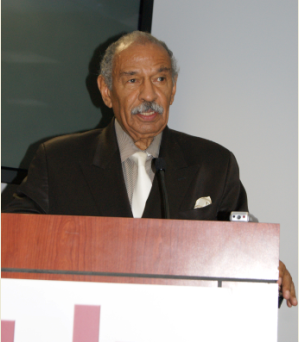This week and last week, EPI President Lawrence Mishel was razor sharp, poking holes in various aspects of conservative economic mythology.
- The United States is not becoming an “entitlement society.”
EPI’s Lawrence Mishel, New York Times columnist and Nobel Prize-winning economist Paul Krugman, and several other noted economists took issue with a recent New York Times article, “Even Critics of Safety Net Increasingly Depend on It,” that suggested the United States is becoming an entitlement society. “Many of the facts presented in the story do not support that conclusion and the ones that do seem to support it are misleading,” Mishel wrote. “[T]here’s no evidence to show we’re becoming an ‘entitlement society,’ just that we’re low on revenues and the economy remains depressed.”
Krugman agreed, writing that Mishel “make[s] a point I was planning to get to: the rise in safety net spending over the past decade does not reflect an expansion of that safety net. Instead, it reflects two things: rising health care costs, and a terrible economic slump that has put many more people in need.”
- Low high school graduation rates are not the cause of diminishing worker wages.
Mishel also responded to the New York Times columnist David Brooks’ contention that many workers have low wages because they never completed high school. Brooks wrote: “I don’t care how many factory jobs have been lost, it still doesn’t make sense to drop out of high school.” Mishel noted that while many people attribute workers’ low wages to not completing high school, the notion is “definitely not true.”

As the graph shows, the share of the workforce (age 18–64) without a high school or further degree (including a GED) has dropped tremendously in the last four decades, from 28.5 percent in 1973 to just 8.4 percent in 2011, a trend true for both men and women. Half of those who have not completed high school are immigrant workers, many of whom were not here for schooling. Furthermore, the education levels of the U.S. workforce have grown tremendously; the share of the workforce with a college degree or further education has doubled since 1973, rising from 14.6 percent in 1973 to one-third in 2011.
“You definitely can’t blame the erosion of workers’ wages on their failure to graduate from high school, since the vast majority did,” Mishel wrote.
Brooks’ fellow columnist at the Times, Paul Krugman, drew the same conclusion in a blog post:
“Nobody — not William Julius Wilson, not Larry Mishel, not yours truly — denies that the bad effects of reduced opportunity would be much less if people always did what was in their best long-term interests. But people often don’t, which is why loss of economic opportunity can be socially as well as economically destructive. That’s not crude materialism, it’s saying that people are human.”
- An increase in working spouses is not causing inequality.
Mishel also debunked the new myth posited in a recent Washington Post op-ed that high inequality is due to more working spouses in high-income households, and well-off people increasingly marrying other well-off people. Specifically, there’s been no increase in two-earner households among the very well-to-do, the top 1% or top 0.1% of households.
Mishel contended that economic trends, not demographic trends, are at the heart of growing inequality. He explained:
“To these folks demographic, rather than economic, trends are generating income inequality. Consequently, economic policy has had no role in causing inequality and cannot ameliorate inequality either. Of course, this is only the latest effort to reduce inequality to a demographic phenomenon: The State of Working America has addressed other such claims going back to the first edition in 1988.”
- The construction industry is not to blame for the country’s high unemployment.
Finally, last week Mishel demonstrated that the above-average construction-sector unemployment is only responsible for a trivial portion of the overall rise in unemployment between 2007 and 2011—and is not what now prevents unemployment from falling more rapidly. In a blog post, Paul Krugman reiterated Mishel’s argument and wrote, “The unemployment rate would be almost as high as it is even if we ignore everyone in or formerly in construction.”
Noam Chomsky cites Josh Bivens’ Failure by Design to deplore growing inequality in the United States
In his recent commentary, “The Hysterical American Decline,” famed linguist and philosopher Noam Chomsky explains both why growing economic inequality is not an accidental occurrence, and how it was purposefully designed to benefit the nation’s top earners. He cites EPI macroeconomist Josh Bivens’ book, Failure by Design: The Story Behind America’s Broken Economy (heralded by theWashington Post as one of th e best political books of 2011), to bolster his argument that the purposeful distribution of economic growth to the rich led to the despair and discontent central to the Occupy movements.
e best political books of 2011), to bolster his argument that the purposeful distribution of economic growth to the rich led to the despair and discontent central to the Occupy movements.
Chomsky wrote:
“A recent study by the Economic Policy Institute, which has been the major source of reputable data on these developments for years, is entitled Failure by Design. The phrase ‘by design’ is accurate. Other choices were certainly possible. And as the study points out, the ‘failure’ is class-based. There is no failure for the designers. Far from it. Rather, the policies are a failure for the large majority, the 99% in the imagery of the Occupy movements — and for the country, which has declined and will continue to do so under these policies.”
Released last year, Failure by Design is even timelier now that the issue of economic inequality is getting the public attention it deserves. The book provides a compelling and reader-friendly narrative that explains how the poor policy choices of the last several decades have wreaked havoc on America’s workers while further enriching the very wealthy.
Click here to learn more about and purchase a copy of Failure by Design.
What’s happening at 1333 H St?
As the country continues February’s celebration of the innumerable contributions African Americans have made, the severe impact the Great Recession has had on the black middle class is all the more startling and disheartening.
On Thursday, EPI’s forum, Achieving full employment for black workers, explored ways to reduce high black unemployment. EPI welcomed Congressman John Conyers (D-Mich.), who delivered the keynote address.
“A job is a human right,” said Conyers in response to deficit hawks who oppose the government implementing job-creation policies. He later applauded EPI’s tireless advocacy of good job-creation programs. “EPI has been critical in putting together new measures that aim for full employment,” Conyers said.

The panelists included Algernon Austin, director of EPI’s Program on Race, Ethnicity, and the Economy; Tanya Clay House, director of public policy, Lawyers’ Committee for Civil Rights Under Law; Valerie Rawlston Wilson, vice president of research and economist, National Urban League Policy Institute; and Brandon Garrett, policy director, Congressional Black Caucus.

At the event, EPI released the new report, No relief in 2012 from high unemployment for African Americans and Latinos. The report reviews unemployment rates by state for African Americans, Latinos, and whites. It finds that the 25 states where African Americans are experiencing unemployment rates of 10 percent or higher are projected to do so through 2012, as will the 14 states where the Latino unemployment rate is 10 percent or higher.